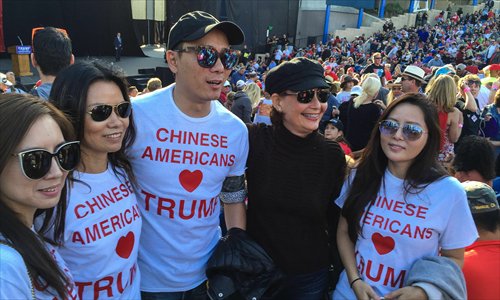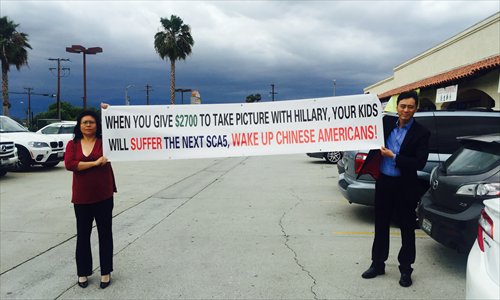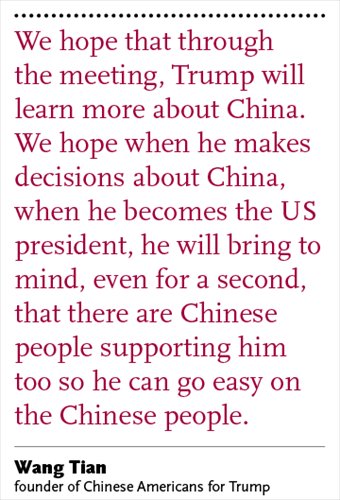Trump’s anti-immigrant rhetoric strikes a chord with Chinese Americans
Presumptive US presidential candidate Donald Trump has angered many voters with his divisive comments on immigrants and trade, but has won a small group of unlikely supporters - Chinese Americans. Some young members of this community have rallied together to support Trump, arguing that he is the candidate that will be best for Sino-US relations.

Wang Tian, center, participates in a rally with other Donald Trump supporters. Photo: Courtesy of Wang Tian
Wang Tian, a Chinese American living Los Angeles, is busy preparing for his upcoming meeting with presumptive Republican presidential nominee, reality TV show star and property tycoon Donald Trump.
Wang founded Chinese Americans for Trump (CAFT) last year, a group dedicated to supporting the candidate. Some of their members who wore "Chinese Americans love Trump" T-shirts to a Trump rally in Southern California last month have even been included in some of his campaign ads.
"Trump is moved by our efforts and agreed to meet us. It is such a big breakthrough!" Wang told the Global Times, adding that this will be the first time that Trump has met with representatives of a Chinese American group on the campaign trail.
Wang hopes that this support will mean reciprocal support if Trump gets into the White House.
"If we don't speak up now, he definitely will not take Chinese Americans into consideration when making future decisions," said Wang.

Wang Tian, right, holds up an anti-Clinton banner. Photo: Courtesy of Wang Tian
WeChat movement
CAFT says it has nearly a thousand volunteers across the US, with new additions picking up pace after Cruz dropped out and Trump became the de facto nominee. Two weeks ago, the group held their third coordination meeting in a Chinese restaurant in LA.
All wearing T shirts emblazoned with their "Chinese Americans love Trump" slogan and badges describing their position in the group (chairman, first vice-chairman, first-class soldier, professional big fan, ordinary fan), dozens of CAFT members excitedly discussed the Trump campaign.
They discussed topics ranging from setting long-term strategic goals to help Trump become Commander-in-chief, to the next steps in their expansion plan such as establishing chapters in more cities and getting their members to participate in campaign events.
While Wang also set "Chinese Americans meeting Trump within two months" as a goal at the meeting, as reported by sina.com, he did not expect that they would achieve it so soon.
"We hope that through the meeting, Trump will learn more about China. We hope when he makes decisions about China, when he becomes the US president, he will bring to mind, even for a second, that there are Chinese people supporting him too so he can go easy on the Chinese people," Wang told the Global Times Monday, explaining that he expects to meet Trump before the end of May.
How CAFT got to where it is today has a lot to do with WeChat, the main platform the group has used to mobilize potential Trump supporters in the Chinese American community.
The CAFT WeChat group which Wang established after Jeb Bush withdrew from the race looks the same as every other chat group, filled with emojis and digital red envelopes each containing a few cents. Most of its members are either Chinese Americans or Chinese citizens with US residency.
"Don't underestimate WeChat. It is the most effective tool for mobilizing Chinese Americans," said Wang, "Through WeChat, Chinese Americans that support Trump will man their posts."
On May 5, when a news piece was posted in the group describing how Hillary Clinton was asking Chinese Americans to pose for photos with her at a $2700-per-person fundraiser, the team quickly arranged a protest, though Clinton left the scene before they arrived. Then Wang posted the story on his personal WeChat to protest and asked "all Chinese Americans with a conscience" to share the post.

Common political ideas
This is not Wang's first foray into politics. Under his "Tiantian" penname, Wang has organized protests over Chinese-American issues such as a segment on the Jimmy Kimmel Live! TV show in which a five-year-old said killing all Chinese people could get rid of US debt and in defense of Chinese American NYPD officer Peter Liang who was found guilty of manslaughter after shooting an unarmed black man.
Calling himself a "grass-roots activist," 32-year-old Wang told the Global Times that he supports Trump because he agrees with several of his policies, such as a crackdown on illegal immigration.
"He does not like illegal immigrants. I don't like them either. He said he loves Chinese people, so do I. He does not like Muslims coming to the US. … I cannot say I don't love them, but I agree that we'd better stop them from coming before we have proper methods guarding against terrorists," Wang told sina.com.
Many other volunteers for CAFT, including Kimmy Liu, who immigrated to the US seven years ago, and Yu Tao, who has been an American citizen for 18 years, have found that Trump's anti-immigrant rhetoric struck a chord with them.
In the past 20 years, Asian voters have generally favored the Democrats. Wang argued that this is because Chinese Americans are relatively poor and hope the Democratic Party will be more generous with welfare. "But it should not be Chinese Americans' American dream. They should try to be entrepreneurs, participate in politics, and join the mainstream in the US," Wang said.
However, according to a 2012 Pew Research Center study of Asian Americans, Chinese American's median full-time wages and median household wealth are actually above the US average, though the poverty rate among Chinese Americans is around 14 percent. The national rate is about 13 percent.
Wang says he supports Trump because he thinks President Trump would be good for the Sino-US relationship. "He is the most suitable one for the mutual benefit of both China and the US," Wang told the Global Times.
Even though Trump has attacked China as having an "unfair advantage" over the US in terms of trade, Wang thinks that Trump targeting China in his campaign is no big deal, because he is "running for US President."
He believes that Trump will be "a friend to China," adding "I cannot see a future for the Sino-US relationship in Hilary Clinton."
Jin Canrong, associate dean of Renmin University's School of International Studies, said Donald Trump is a pragmatic politican, and China is good at dealing with pragmatists, according to a comment published by guancha.cn. There will be fierce rivalry between China and the US once Trump takes the helm, but China doesn't fear competition. What China opposes and dislikes is someone who forcefully applies their own model to others, and Trump is certainly not that kind of politician.
Speaking up for the right
Despite enthusiastic support on the WeChat chat group, Wang knows that CAFT are a minority in their community.
"We are like pandas here. There are so few Chinese Americans like us," Wang shared with the Global Times.
"They are a minority in the US, but in recent years, Chinese Americans are more and more active in political affairs, and particularly in states where Chinese are concentrated. All candidates seek support from Chinese Americans," noted Jia Qingguo, an expert in American studies and director of the School of International Studies at Peking University.
Yu Tao describes herself as "a Chinese woman who loves Trump" on her Twitter account, and now she's seeking opportunities to support Trump. "If I post something about Trump and someone challenges me, I will try to persuade them and tell them why Chinese should support Trump and the Republicans," she told sina.com.
Yu said Chinese used to be indifferent to politics and only cared for making money but have now begun to realize that in the US, no matter how much money you make, you are still controlled by others if you do not participate in politics.
"We can only rely on politics and hope to make ourselves stronger through legislation, so that Chinese Americans can live better in the US," Wang said.
"In the past, the older generations of Chinese immigrants lived at the bottom of society, so they didn't have a chance to speak out. The new generation of Chinese Americans are well educated and know better how to protect their rights. They have resources and know how to participate in politics. It is natural," Jia told the Global Times.
"The voice of Chinese Americans is rather diverse in US politics. By supporting a certain candidate, the most direct effect is still to change their lives," commented Jia, "It is hard to say to what extent they will affect Sino-US relations. Instead, it might make Americans pay more attention to the US policy toward China and interpret things in terms of ideology, which might not be a good thing."
Newspaper headline: Unlikely supporters